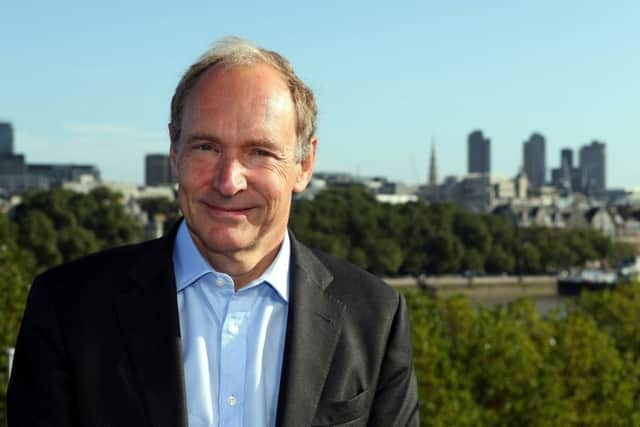The web at 30: Crooks and clickbait have taken over, says Sir Tim Berners-Lee
He had conceived the communications network that now connects half the world’s population as a fount of knowledge and creativity.
But it had also become, he acknowledged, a den of crime, hatred and misinformation, and he called on politicians and the public to “come together” to move it to a higher plain.
Advertisement
Hide AdAdvertisement
Hide Ad“If we give up on building a better web now, then the web will not have failed us – we will have failed the web,” he said.


Sir Tim was a 33-year-old Oxford graduate contracted to CERN, the European Organisation for Nuclear Research, when in March 1989 he wrote a proposal for a system that would share information seamlessly among researchers by using a universal network of cross-linking he termed “hypertext”.
“Vague but exciting,” was the brief response from his boss, Mike Sendall, who added: “And now?”
The principle Sir Tim outlined underpins the web today, but it has been hijacked by criminals, rogue governments and others who had “spread hatred and made all kinds of crime easier to commit”, he said in an open letter, published in advance of an anniversary event at the Science Museum.
Advertisement
Hide AdAdvertisement
Hide AdHe said the three sources of dysfunction that required the most urgent correction were “deliberate, malicious intent, such as state-sponsored hacking”; the “viral spread of misinformation”, and what he called “perverse incentives such as ad-based revenue models that commercially reward clickbait”.
Sir Tim also called for a response to the “unintended negative consequences” of the web, which he said had led to “the outraged and polarised tone and quality of online discourse”.
He did not identify an individual government that had spread untruths, but said “we can create both laws and code to minimise this behaviour, just as we have always done offline”.
The World Wide Web Foundation, which Sir Tim set up 10 years ago, is developing what it calls a Contract for the Web, which aims to see the internet run for the public good and access to it guaranteed as a human right.
Advertisement
Hide AdAdvertisement
Hide AdThe organisation was working with governments and others on building the contract, Sir Tim said, but he called on politicians and the wider society to ensure it was not just a “list of quick fixes”.
“Governments must translate laws and regulations for the digital age. They must ensure markets remain competitive, innovative and open. And they have a responsibility to protect people’s rights and freedoms online,” he said.
“We need open web champions within government – civil servants and elected officials who will take action when private sector interests threaten the public good and who will stand up to protect the open web.
“Companies must do more to ensure their pursuit of short-term profit is not at the expense of human rights, democracy, scientific fact or public safety. Platforms and products must be designed with privacy, diversity and security in mind.
Advertisement
Hide AdAdvertisement
Hide Ad“If we don’t do our part to foster constructive healthy conversations online, if we continue to click consent without demanding our data rights be respected, we walk away from our responsibility to put these issues on the priority agenda of our governments.”
Sir Tim also said there was an “urgent” need to get the rest of the world online.
“The web is for everyone and collectively we hold the power to change it. It won’t be easy. But if we dream a little and work a lot, we can get the web we want,” the London-born scientist said.
His intervention comes amid a wider debate on regulation of the web and other online spaces, with the British Government expected to publish its views in a White Paper in the near future.
Advertisement
Hide AdAdvertisement
Hide AdShortly before Sir Tim’s letter was published, the Digital Secretary, Jeremy Wright, had met victims of cyber bullying, revenge porn and hate speech, as part of Government plans to protect people online. Mr Wright said: “The era of self-regulation is coming to an end and online platforms will have to do more to keep their users safe.”